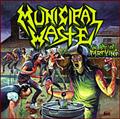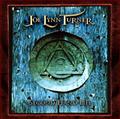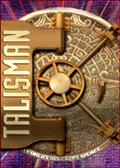SVARTSOT (dk) - Ravnenes Saga (2007)

Label : Napalm Records / Season of Mist
Sortie du Scud : 5 novembre 2007
Pays : Danemark
Genre : Folk/Viking Metal
Type : Album
Playtime : 11 Titres - 42 Mins
Le Folk Metal est devenu en quelques années un style en vogue, à la mode grâce aux précurseurs et leaders que sont FINNTROLL ou KORPILKLAANI. Ce style festif et dansant ravi tout les amateurs de guitare saturées, de mélodies champêtres et folkloriques de buveur de bière lors de la fête du village.
Les ingrédients nécessaires sont des instruments atypiques, un rythme entraînant, un accoutrement moyenâgeux, et surtout une bonne humeur festive et communicative ! L’intérêt suscité par ce style Folk Viking a pour effet que la scène commence à être saturée, un bon nombre de groupe s’engouffre dans cette brèche ouverte… on y retrouve donc des groupes de la seconde vague comme TYR ou SVARTSOT.
Après deux démos, SVARTSOT sort son premier véritable album Ravnenes Saga via le biais du label Napalm Records. Dans la pure lignée de groupes tels que FINNTROLL ou KORPIKLAANI, les Danois propose ici un premier opus dansant, efficace et entraînant ! Ravnenes Saga reprend toutes les caractéristiques nécessaires au style. Les instruments folkloriques atypiques sont bien présents : flûtes, bodhran ou mandoline apportent ce coté païen et viking. Les mélodies sont musclées, entraînantes, dansantes, mais souvent redondantes. Au sein de SVARTSOT, c’est Stewart Lewis qui est en charge de tous ces instruments particuliers, le groupe ne se cache pas derrière un claviériste et mise sur la véracité du son de ces instruments. Autre choses qui différencies ces Danois est le chant : sur la majorité des albums de Folk/viking/Metal, le chant est criard (genre Black) ou un chant sobre et clair, le chanteur de SVARTSOT utilise un chant guttural qui pourrait être utilisé par n’importe quel groupe de Death Metal. Cette particularité est à double tranchant : pour s’extraire de la masse, l’utilisation de ce type de chant demande une dynamique plus importante de la part de la musique. Ce chant lourd plombe le coté festif. Ce détail n’obscure pas la qualité et l’énergie des compositions.
Très facile d’accès, Ravnenes Saga est mémorisable dès les toutes premières écoutes. Ceci n’est pas seulement dû aux nombreuses similitudes que l’on peut retrouver avec les groupes du genre, mais aussi à la qualité des titres : efficaces et entraînants. Cette assimilation rapide peut néanmoins nuire à la longévité de ce disque…
Ajouté : Vendredi 07 Décembre 2007
Chroniqueur : Warloghe
Score :    
Lien en relation: Svartsot Website
Hits: 10461
|














